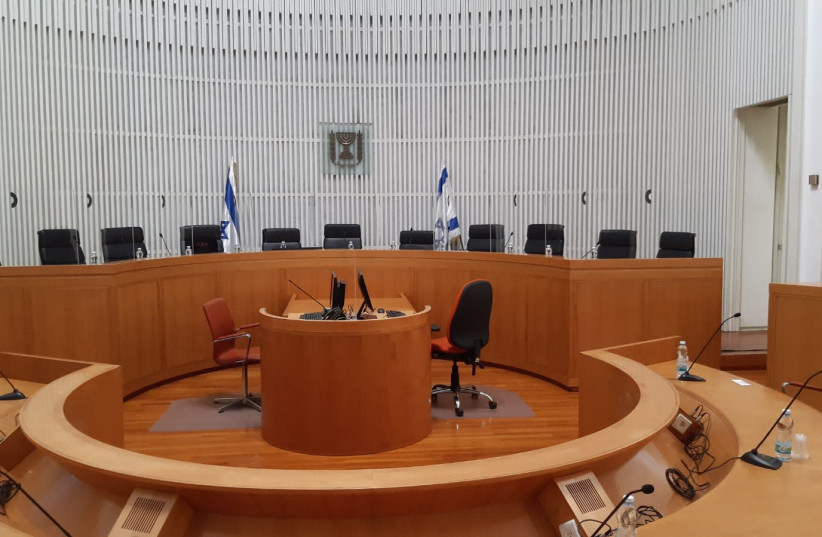Leading members of the emerging coalition under Benjamin Netanyahu are said to be in favor of resurrecting a proposal to enable a slim majority of 61 of the Knesset’s 120 MKs to override rulings by the Supreme Court, which also doubles as the High Court of Justice. Most legal experts and jurists warn that this would be a dangerous development, allowing a slim parliamentary majority to do whatever it wishes without checks and balances – although some would support a bill that requires a special majority of 70 or 80 MKs.
Dr. Amir Fuchs, a senior researcher at the Israel Democracy Institute, says the 61-MK override proposal, if passed, would not only significantly weaken the Supreme Court and harm the separation of powers that now exists in Israel’s vibrant democracy, it would enable the government to pass legislation without judicial oversight.
“We don’t have the checks and balances in our system that other countries have besides the Supreme Court, and if you take away the binding nature of the Supreme Court and allow politicians to override the court, it makes it very easy for a coalition to pass any law they want.”
Dr. Amir Fuchs
“We don’t have the checks and balances in our system that other countries have besides the Supreme Court, and if you take away the binding nature of the Supreme Court and allow politicians to override the court, it makes it very easy for a coalition to pass any law they want,” Fuchs told The Jerusalem Post. “The override clause, specifically in Israel, where we don’t have a full constitution, is very dangerous.”
Some members of the new coalition, notably Religious Zionist Party leaders Bezalel Smotrich and Itamar Ben-Gvir, view the passage of such legislation as an ideological imperative. Last month, Smotrich made it clear that his party would demand the Justice portfolio as he unveiled his program of radical legal reforms that would not only severely curtail judicial authority but also end Netanyahu’s criminal trial.
Among the steps Smotrich outlined were curbing the ability of the Supreme Court to strike down Knesset legislation that violates one of the Basic Laws and granting the government ultimate control over the appointment of judges – including those serving in the High Court.
Netanyahu and his Likud Party are expected to support the Smotrich reforms primarily because they believe that unless the High Court’s wings are cut, it will still have the ability to overturn a move to halt Netanyahu’s trial.
It should be noted that this is not the first time an override clause has been floated.
In 2012, former justice minister Yaakov Neeman – who was appointed by Netanyahu – proposed a 65-MK override. In 2018, when Netanyahu was prime minister and Ayelet Shaked was justice minister, the ministerial committee on legislation voted in favor of giving the Knesset the power to override the Supreme Court with a 61-vote majority when it vetoes a Knesset law. But legislation was never enacted as Israel entered a period of political instability.
Supporters of a 61-lawmaker override say they merely want to restore the legal situation that existed until the early 1990s, before the Knesset passed two Basic Laws – one on Human Dignity and Freedom and the other on Freedom of Occupation. The Basic Law on Freedom of Occupation already has a clause allowing 61 lawmakers to reinstate overturned laws for a limited period, but no such clause exists in the Basic Law on Human Dignity and Freedom, which is the court’s main means of protecting minority rights.
Fuchs said no other country has an override clause except Canada, which was drafted with clear restrictions as a compromise between the provinces. “Most countries have a constitution, and an override clause is a contradiction to the whole idea of a binding constitution that limits the majority,” he said. “If the majority wants to change something fundamental, they can change the constitution. In Israel, they can change the Basic Laws, but the override clause gives politicians the sense that they can pass any specific law without changing the system.”
As our legal correspondent Yonah Jeremy Bob reported, former Supreme Court president Aharon Barak warned in 2019 that a 61-MK override would disproportionately harm both the court and ordinary Israelis, but he did not rule out an override requiring a larger majority. He proposed 80 lawmakers as a more decisive figure.
We agree. You don’t have to be an expert in the rule of law or the separation of powers to understand that a slim majority of one Knesset member should not be sufficient to overturn a judicial ruling.

